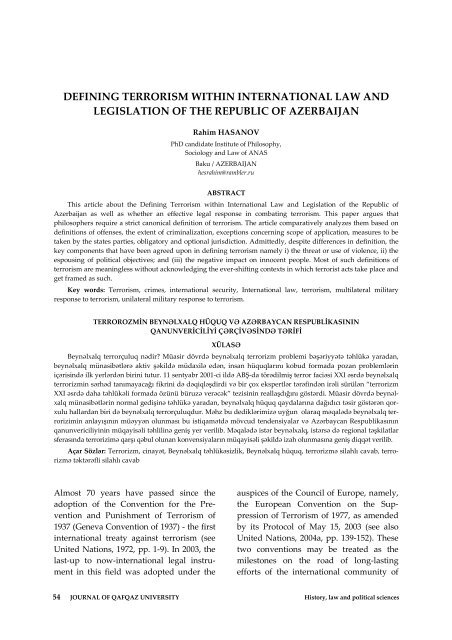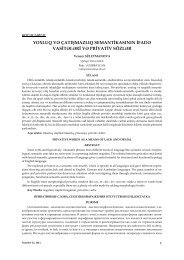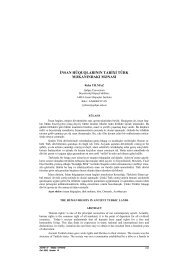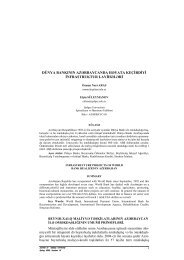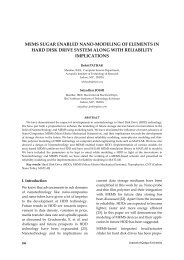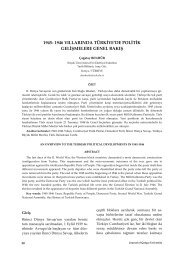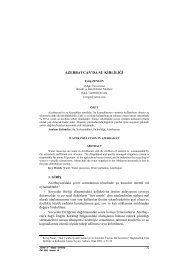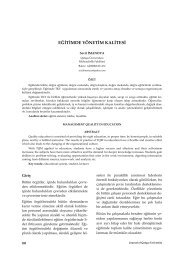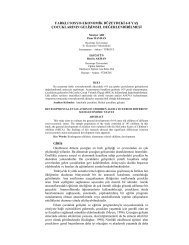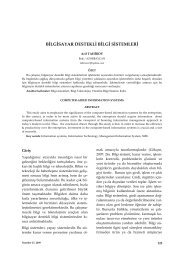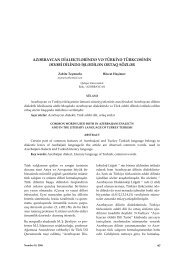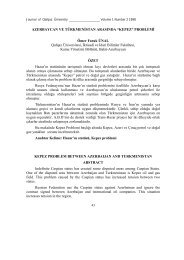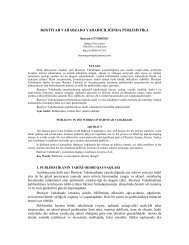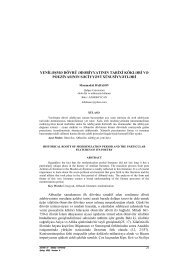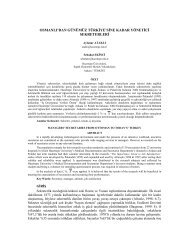defining terrorism within international law and legislation of the ...
defining terrorism within international law and legislation of the ...
defining terrorism within international law and legislation of the ...
Create successful ePaper yourself
Turn your PDF publications into a flip-book with our unique Google optimized e-Paper software.
DEFINING TERRORISM WITHIN INTERNATIONAL LAW AND<br />
LEGISLATION OF THE REPUBLIC OF AZERBAIJAN<br />
Rahim HASANOV<br />
PhD c<strong>and</strong>idate Institute <strong>of</strong> Philosophy,<br />
Sociology <strong>and</strong> Law <strong>of</strong> ANAS<br />
Baku / AZERBAIJAN<br />
hesrahim@rambler.ru<br />
ABSTRACT<br />
This article about <strong>the</strong> Defining Terrorism <strong>within</strong> International Law <strong>and</strong> Legislation <strong>of</strong> <strong>the</strong> Republic <strong>of</strong><br />
Azerbaijan as well as whe<strong>the</strong>r an effective legal response in combating <strong>terrorism</strong>. This paper argues that<br />
philosophers require a strict canonical definition <strong>of</strong> <strong>terrorism</strong>. The article comparatively analyzes <strong>the</strong>m based on<br />
definitions <strong>of</strong> <strong>of</strong>fenses, <strong>the</strong> extent <strong>of</strong> criminalization, exceptions concerning scope <strong>of</strong> application, measures to be<br />
taken by <strong>the</strong> states parties, obligatory <strong>and</strong> optional jurisdiction. Admittedly, despite differences in definition, <strong>the</strong><br />
key components that have been agreed upon in <strong>defining</strong> <strong>terrorism</strong> namely i) <strong>the</strong> threat or use <strong>of</strong> violence, ii) <strong>the</strong><br />
espousing <strong>of</strong> political objectives; <strong>and</strong> (iii) <strong>the</strong> negative impact on innocent people. Most <strong>of</strong> such definitions <strong>of</strong><br />
<strong>terrorism</strong> are meaningless without acknowledging <strong>the</strong> ever-shifting contexts in which terrorist acts take place <strong>and</strong><br />
get framed as such.<br />
Key words: Terrorism, crimes, <strong>international</strong> security, International <strong>law</strong>, <strong>terrorism</strong>, multilateral military<br />
response to <strong>terrorism</strong>, unilateral military response to <strong>terrorism</strong>.<br />
TERROROZMİN BEYNƏLXALQ HÜQUQ VƏ AZƏRBAYCAN RESPUBLİKASININ<br />
QANUNVERİCİLİYİ ÇƏRÇİVƏSİNDƏ TƏRİFİ<br />
XÜLASƏ<br />
Bеynəlхаlq tеrrоrçuluq nədir? Müаsir dövrdə bеynəlхаlq tеrrоrizm prоblеmi bəşəriyyətə təhlükə yаrаdаn,<br />
bеynəlхаlq münаsibətlərə аktiv şəkildə müdахilə еdən, insаn hüquqlаrını kоbud fоrmаdа pоzаn prоblеmlərin<br />
içərisində ilk yеrlərdən birini tutur. 11 sеntyаbr 2001-ci ildə АBŞ-dа törədilmiş tеrrоr fаciəsi ХХI əsrdə bеynəlхаlq<br />
tеrrоrizmin sərhəd tаnımаyаcаğı fikrini də dəqiqləşdirdi və bir çох еkspеrtlər tərəfindən irəli sürülən “tеrrоrizm<br />
ХХI əsrdə dаhа təhlükəli fоrmаdа özünü büruzə vеrəcək” tеzisinin rеаllаşdığını göstərdi. Müаsir dövrdə bеynəlхаlq<br />
münаsibətlərin nоrmаl gеdişinə təhlükə yаrаdаn, bеynəlхаlq hüquq qаydаlаrınа dаğıdıcı təsir göstərən qоrхulu<br />
hаllаrdаn biri də bеynəlхаlq tеrrоrçuluqdur. Məhz bu dediklərimizə uyğun olaraq məqalədə beynəlxalq terrorizimin<br />
anlayışının müəyyən olunması bu istiqamətdə mövcud tendensiyalar və Azərbaycan Respublikasının<br />
qanunvericiliyinin müqayisəli təhlilinə geniş yer verilib. Məqalədə istər beynəlxalq, istərsə də regional təşkilatlar<br />
sferasında terrorizimə qarşı qəbul olunan konvensiyaların müqayisəli şəkildə izah olunmasına geniş diqqət verilib.<br />
Açar Sözlər: Terrorizm, cinayət, Beynəlxalq təhlükəsizlik, Beynəlxalq hüquq, terrorizmə silahlı cavab, terrorizmə<br />
təktərəfli silahlı cavab<br />
Almost 70 years have passed since <strong>the</strong><br />
adoption <strong>of</strong> <strong>the</strong> Convention for <strong>the</strong> Prevention<br />
<strong>and</strong> Punishment <strong>of</strong> Terrorism <strong>of</strong><br />
1937 (Geneva Convention <strong>of</strong> 1937) - <strong>the</strong> first<br />
<strong>international</strong> treaty against <strong>terrorism</strong> (see<br />
United Nations, 1972, pp. 1-9). In 2003, <strong>the</strong><br />
last-up to now-<strong>international</strong> legal instrument<br />
in this field was adopted under <strong>the</strong><br />
auspices <strong>of</strong> <strong>the</strong> Council <strong>of</strong> Europe, namely,<br />
<strong>the</strong> European Convention on <strong>the</strong> Suppression<br />
<strong>of</strong> Terrorism <strong>of</strong> 1977, as amended<br />
by its Protocol <strong>of</strong> May 15, 2003 (see also<br />
United Nations, 2004a, pp. 139-152). These<br />
two conventions may be treated as <strong>the</strong><br />
milestones on <strong>the</strong> road <strong>of</strong> long-lasting<br />
efforts <strong>of</strong> <strong>the</strong> <strong>international</strong> community <strong>of</strong><br />
54<br />
JOURNAL OF QAFQAZ UNIVERSITY<br />
History, <strong>law</strong> <strong>and</strong> political sciences
Defining <strong>terrorism</strong> <strong>within</strong> <strong>international</strong> <strong>law</strong> <strong>and</strong> <strong>legislation</strong> <strong>of</strong> <strong>the</strong> Republic <strong>of</strong> Azerbaijan<br />
states to create an effective legal response<br />
to one <strong>of</strong> <strong>the</strong> most disastrous <strong>and</strong> horrifying<br />
phenomena <strong>of</strong> our times: <strong>international</strong><br />
<strong>terrorism</strong>. Although <strong>the</strong> Geneva Convention<br />
<strong>of</strong> 1937 (see United Nations, 1972), unfortunately,<br />
has never entered into force, one<br />
cannot overestimate its importance as <strong>the</strong><br />
first comprehensive <strong>and</strong> multilateral antiterrorist<br />
convention. Fur<strong>the</strong>rmore, it was<br />
accompanied by ano<strong>the</strong>r <strong>international</strong> treaty<br />
providing for <strong>the</strong> establishment <strong>of</strong> <strong>the</strong> first<br />
<strong>international</strong> criminal court for <strong>the</strong> punishment<br />
<strong>of</strong> terrorists, a precursor <strong>of</strong> postwar<br />
<strong>international</strong> criminal tribunals. Also for<br />
<strong>the</strong> first time, <strong>the</strong> Geneva Convention <strong>of</strong><br />
1937 formulated a definition <strong>of</strong> acts <strong>of</strong><br />
<strong>terrorism</strong>, described <strong>the</strong>rein as “criminal<br />
acts directed against a State or intended to<br />
create a state <strong>of</strong> terror in <strong>the</strong> minds <strong>of</strong> particular<br />
persons, or a group <strong>of</strong> persons, or <strong>the</strong><br />
general public” (Article 1, para. 1; see<br />
United Nations, 1972). (1)<br />
As already mentioned, <strong>the</strong> first <strong>international</strong><br />
attempt to define acts <strong>of</strong> <strong>terrorism</strong> was<br />
undertaken by <strong>the</strong> Geneva Convention <strong>of</strong><br />
1937 (see United Nations, 1972). Since <strong>the</strong>n,<br />
<strong>the</strong> question <strong>of</strong> <strong>defining</strong> <strong>international</strong> <strong>terrorism</strong><br />
remains <strong>the</strong> most difficult <strong>and</strong> unsatisfactorily<br />
solved for all engaged in <strong>the</strong> process<br />
<strong>of</strong> elaboration <strong>of</strong> antiterrorist treaties,<br />
ei<strong>the</strong>r universal or regional.<br />
Conventional practice shows that so-called<br />
sectoral conventions have had a relatively<br />
easier job in this field because <strong>the</strong>ir substantial<br />
scope <strong>of</strong> operation is limited to<br />
specific kinds <strong>and</strong> forms <strong>of</strong> terrorist activities.<br />
The first <strong>of</strong> such sectoral definitions<br />
was contained in <strong>the</strong> Convention for <strong>the</strong><br />
Suppression <strong>of</strong> Un<strong>law</strong>ful Seizure <strong>of</strong> Aircraft<br />
<strong>of</strong> 1970, which defines <strong>the</strong> <strong>of</strong>fense <strong>of</strong><br />
un<strong>law</strong>ful seizure <strong>of</strong> aircraft as committed by<br />
any person who on board an aircraft in<br />
flight: (a) un<strong>law</strong>fully, by force or threat<br />
<strong>the</strong>re<strong>of</strong>, or by any o<strong>the</strong>r form <strong>of</strong> intimidation,<br />
seizes, or exercises control <strong>of</strong>, that<br />
aircraft, or attempts to perform any such<br />
act, or (b) is an accomplice <strong>of</strong> a person who<br />
performs or attempts to perform any such<br />
act. (Article 1)<br />
All contracting states to this convention<br />
have been obliged to make <strong>the</strong> said <strong>of</strong>fense<br />
“punishable by severe penalties” (Article 2).<br />
This definition later served as a model for<br />
subsequent definitions included in o<strong>the</strong>r<br />
sectoral <strong>international</strong> legal instruments. In<br />
consequence, we have a series <strong>of</strong> universal<br />
sectoral definitions <strong>of</strong> terrorist acts, including<br />
such <strong>of</strong>fenses as “un<strong>law</strong>ful acts against<br />
safety <strong>of</strong> civil aviation” (in 1971), “crimes<br />
against inter-nationally protected persons,<br />
including diplomatic agents” (in 1973),<br />
“taking hostages” (in 1979), “<strong>the</strong>ft, robbery<br />
or any o<strong>the</strong>r un<strong>law</strong>ful taking <strong>of</strong> nuclear<br />
material or <strong>of</strong> credible threat <strong>the</strong>re<strong>of</strong>” (in<br />
1979), “un<strong>law</strong>ful acts <strong>of</strong> violence at airports<br />
serving <strong>international</strong> civil aviation” (in<br />
1988), “un<strong>law</strong>ful acts against <strong>the</strong> safety <strong>of</strong><br />
fixed platforms located on <strong>the</strong> continental<br />
shelf” (in 1988), “terrorist bombings” (in<br />
1997), <strong>and</strong> “financing <strong>of</strong> <strong>terrorism</strong>” (in<br />
1999). (2)<br />
In <strong>the</strong> case <strong>of</strong> <strong>the</strong> last definition, contained<br />
in <strong>the</strong> International Convention for <strong>the</strong><br />
Suppression <strong>of</strong> <strong>the</strong> Financing <strong>of</strong> Terrorism<br />
<strong>of</strong> 1999, it may be said that its sectoral<br />
character has been doubled. First <strong>of</strong> all, this<br />
convention recognizes that an <strong>of</strong>fense is<br />
committed if a person by any means, directly<br />
or indirectly, un<strong>law</strong>fully <strong>and</strong> willfully,<br />
provides or collects funds with <strong>the</strong><br />
intention that <strong>the</strong>y should be used or in <strong>the</strong><br />
knowledge that <strong>the</strong>y are to be used, in full<br />
or in part, in order to carry out ... an act<br />
which constitutes an <strong>of</strong>fence <strong>within</strong> <strong>the</strong><br />
scope <strong>of</strong> <strong>and</strong> as defined in one <strong>of</strong> <strong>the</strong> treaties<br />
listed in <strong>the</strong> annex. (Article 2, para. 1)<br />
And subsequently, in <strong>the</strong> annex accompanying<br />
<strong>the</strong> convention, one finds a list <strong>of</strong><br />
nine universal sectoral conventions, starting<br />
Number 29, 2010 55
Rahim Hasanov<br />
with <strong>the</strong> Convention for <strong>the</strong> Suppression <strong>of</strong><br />
Un<strong>law</strong>ful Seizure <strong>of</strong> Aircraft <strong>of</strong> 1970 <strong>and</strong><br />
ending with <strong>the</strong> International Convention<br />
for <strong>the</strong> Suppression <strong>of</strong> Terrorist Bombings<br />
<strong>of</strong> 1997. Article 23 <strong>of</strong> <strong>the</strong> International<br />
Convention for <strong>the</strong> Suppression <strong>of</strong> <strong>the</strong><br />
Financing <strong>of</strong> Terror-ism <strong>of</strong> 1999 also<br />
provides that <strong>the</strong> said list may be extended<br />
in <strong>the</strong> future — through a relatively easier<br />
procedure — by <strong>the</strong> addition <strong>of</strong> o<strong>the</strong>r<br />
relevant antiterrorist treaties. This approach,<br />
allowing one to avoid searching for a<br />
substantial <strong>and</strong> exhaustive comprehensive<br />
definition <strong>of</strong> <strong>international</strong> <strong>terrorism</strong>, also has<br />
been applied by o<strong>the</strong>r regional conventions<br />
<strong>and</strong> drafts aiming to elaborate such a<br />
comprehensive definition. (3)<br />
There is also a specific sectoral definition <strong>of</strong><br />
regional nature contained in <strong>the</strong> abovementioned<br />
Organization <strong>of</strong> American States<br />
Convention <strong>of</strong> 1971 that deals with “acts <strong>of</strong><br />
<strong>terrorism</strong> taking <strong>the</strong> form <strong>of</strong> crimes against<br />
persons <strong>and</strong> related extortion that are <strong>of</strong><br />
<strong>international</strong> significance” (Article 2).<br />
All sectoral conventions provide for <strong>the</strong><br />
obligation <strong>of</strong> <strong>the</strong>ir states’ parties to criminalize<br />
acts described by <strong>the</strong>se treaties as<br />
<strong>of</strong>fenses. It is <strong>the</strong> obligation ei<strong>the</strong>r to “make<br />
<strong>the</strong> <strong>of</strong>fence punishable by severe penalties”<br />
(e.g., <strong>the</strong> Convention for <strong>the</strong> Suppression <strong>of</strong><br />
Un<strong>law</strong>ful Seizure <strong>of</strong> Aircraft <strong>of</strong> 1970, Article<br />
2) or to make <strong>the</strong>se crimes “punishable by<br />
appropriate penalties which take into<br />
account <strong>the</strong> grave nature <strong>of</strong> <strong>the</strong> <strong>of</strong>fences”<br />
(e.g., <strong>the</strong> International Convention for <strong>the</strong><br />
Suppression <strong>of</strong> <strong>the</strong> Financing <strong>of</strong> Terrorism<br />
<strong>of</strong> 1999, Article 4b). The first <strong>international</strong>ly<br />
adopted comprehensive definition <strong>of</strong> acts <strong>of</strong><br />
terror-ism was elaborated, as observed above,<br />
<strong>within</strong> <strong>the</strong> framework <strong>of</strong> <strong>the</strong> Geneva<br />
Convention <strong>of</strong> 1937 (see United Nations,<br />
1972); such acts are defined as “criminal<br />
acts directed against a State or intended to<br />
create a state <strong>of</strong> terror in <strong>the</strong> minds <strong>of</strong><br />
particular persons, or a group <strong>of</strong> persons or<br />
<strong>the</strong> general public” (Article 1, para. 2). In<br />
addition, this convention’s definition is<br />
accompanied by more detailed provisions,<br />
saying that <strong>the</strong>se acts would include “any<br />
willful act causing death or grievous body<br />
harm or loss <strong>of</strong> liberty” to public <strong>of</strong>ficials in<br />
general (Article 2, para. 1a, 1b, 1c), “any<br />
willful act calculated to endanger <strong>the</strong> lives<br />
<strong>of</strong> members <strong>of</strong> <strong>the</strong> public” (Article 2, para.<br />
3), “willful destruction <strong>of</strong> or damage to<br />
public property” (Article 2, para. 2), <strong>and</strong><br />
“manufacture, obtaining, possession or<br />
supplying <strong>of</strong> arms or ammunition, explosives<br />
or harmful substances with a view to<br />
<strong>the</strong> commission in any country whatsoever”<br />
<strong>of</strong> one <strong>of</strong> <strong>the</strong> <strong>of</strong>fenses mentioned (Article 2,<br />
para. 5). This convention also covers<br />
attempts; conspiracy; incitement, if successful,<br />
to all <strong>of</strong>fenses; direct public incitement<br />
to certain acts even if unsuccessful; willful<br />
participation; <strong>and</strong> assistance knowingly<br />
given. Although <strong>the</strong>re were numerous<br />
attempts toward this end, toge<strong>the</strong>r with <strong>the</strong><br />
establishment in 1972 <strong>of</strong> <strong>the</strong> UN Ad Hoc<br />
Committee on <strong>terrorism</strong> as well as appropriate<br />
drafts presented by individual states,<br />
it was impossible—because <strong>of</strong> political<br />
differences — to reach a final consensus<br />
concerning a generally accept-able, comprehensive<br />
definition <strong>of</strong> <strong>international</strong><br />
<strong>terrorism</strong> toge<strong>the</strong>r with <strong>the</strong> conclusion <strong>of</strong> an<br />
appropriate universal comprehensive convention<br />
(Franck & Lock-wood, 1974). A<br />
revival <strong>of</strong> <strong>the</strong> United Nation’s efforts in this<br />
field brought to life a new body, that is, <strong>the</strong><br />
Ad Hoc Committee on <strong>terrorism</strong> (United<br />
Nations, 1996). (4)<br />
Suffering <strong>the</strong> lack <strong>of</strong> a legally binding universal<br />
comprehensive definition <strong>of</strong> <strong>international</strong><br />
<strong>terrorism</strong>, we have to stress that such<br />
definitions have been elaborated by some<br />
regional conventions already. Some <strong>of</strong> <strong>the</strong>m<br />
adopted an easier method, establishing <strong>the</strong>ir<br />
scope <strong>of</strong> application by including in <strong>the</strong>ir<br />
texts <strong>the</strong> list <strong>of</strong> universal sectoral conventions<br />
or <strong>of</strong>fenses established in <strong>the</strong>se<br />
56<br />
JOURNAL OF QAFQAZ UNIVERSITY<br />
History, <strong>law</strong> <strong>and</strong> political sciences
Defining <strong>terrorism</strong> <strong>within</strong> <strong>international</strong> <strong>law</strong> <strong>and</strong> <strong>legislation</strong> <strong>of</strong> <strong>the</strong> Republic <strong>of</strong> Azerbaijan<br />
conventions, for example, <strong>the</strong> European<br />
Convention on <strong>the</strong> Suppression <strong>of</strong> Terrorism<br />
<strong>of</strong> 1977, as amended by its Protocol <strong>of</strong> 2003,<br />
Article 1 (see also United Nations, 2004a,<br />
pp. 139-152), <strong>and</strong> <strong>the</strong> Inter-American Convention<br />
Against Terrorism <strong>of</strong> 2002, Article<br />
2 (see United Nations, 2004a, pp. 239-250).<br />
Ano<strong>the</strong>r group <strong>of</strong> regional conventions—<br />
<strong>the</strong> Organization <strong>of</strong> African Unity Convention<br />
on <strong>the</strong> Prevention <strong>and</strong> Combating <strong>of</strong><br />
Terrorism <strong>of</strong> 1999, Article 1, paragraph 3<br />
(see United Nations, 2004a, pp. 210-225)<br />
<strong>and</strong> <strong>the</strong> Treaty on Cooperation Among <strong>the</strong><br />
States Members <strong>of</strong> <strong>the</strong> Commonwealth <strong>of</strong><br />
Independent States in Combating Terrorism<br />
<strong>of</strong> 1999, Article 1 (see United Nations,<br />
2004a, pp. 175-187)—tries to elaborate a<br />
substantial comprehensive definition <strong>of</strong><br />
<strong>terrorism</strong> or <strong>of</strong> terrorist acts, describing <strong>the</strong>m<br />
with subjective <strong>and</strong> objective characteristics<br />
<strong>of</strong> criminal acts. Finally, <strong>the</strong>re are regional<br />
conventions <strong>of</strong> comprehensive character<br />
that try to combine <strong>the</strong> methods <strong>of</strong> <strong>defining</strong><br />
<strong>terrorism</strong> applied by two previous categories:<br />
<strong>the</strong> Arab Convention on <strong>the</strong> Suppression <strong>of</strong><br />
Terrorism <strong>of</strong> 1998, Article 1 (see United<br />
Nations, 2004a, pp. 158-174); <strong>the</strong> Convention<br />
<strong>of</strong> <strong>the</strong> Organization <strong>of</strong> <strong>the</strong> Islamic Conference<br />
on Combating International Terrorism <strong>of</strong><br />
1999, Article 1 (see United Nations, 2004a,<br />
pp. 188-209); <strong>the</strong> original version <strong>of</strong> <strong>the</strong><br />
European Convention on <strong>the</strong> Suppression<br />
<strong>of</strong> Terrorism <strong>of</strong> 1977, Article 1 (United<br />
Nations, 2001, pp. 139-146); <strong>and</strong> <strong>the</strong> South<br />
Asian Association for Regional Cooperation<br />
Regional Convention on Suppression <strong>of</strong><br />
Terrorism <strong>of</strong> 1987, Article 1 (see United<br />
Nations, 2004a, pp. 153-157). (5)<br />
Prosecution <strong>of</strong> delicta juris gentium<br />
<strong>and</strong> <strong>terrorism</strong><br />
The outrage felt in <strong>the</strong> aftermath <strong>of</strong> <strong>the</strong><br />
Second World War, whilst leading to <strong>the</strong><br />
Nuremberg <strong>and</strong> Tokyo trials <strong>and</strong> <strong>the</strong><br />
adoption <strong>of</strong> <strong>the</strong> Genocide Convention in<br />
1948, did not translate immediately into <strong>the</strong><br />
creation <strong>of</strong> a new order <strong>of</strong> <strong>international</strong><br />
criminal justice. The International Law<br />
Commission, a United Nations body comprised<br />
<strong>of</strong> prominent legal experts <strong>and</strong><br />
devoted to <strong>the</strong> progressive development <strong>of</strong><br />
<strong>international</strong> <strong>law</strong>, was tasked with drafting<br />
a statute for an <strong>international</strong> criminal court.<br />
But <strong>the</strong> process lacked momentum <strong>and</strong> did<br />
not yield tangible results. This changed in<br />
<strong>the</strong> post-Cold War period. In 1993, <strong>the</strong><br />
Security Council, faced with wars in <strong>the</strong><br />
former Yugoslavia, set up <strong>the</strong> International<br />
Criminal Tribunal for Yugoslavia (<strong>the</strong><br />
ICTY) <strong>and</strong>, a year later, established <strong>the</strong><br />
International Criminal Tribunal for Rw<strong>and</strong>a<br />
(<strong>the</strong> ICTR) in response to <strong>the</strong> Rw<strong>and</strong>an<br />
genocide. In 1998, <strong>the</strong> Statute <strong>of</strong> <strong>the</strong> International<br />
Criminal Court was adopted in<br />
Rome, leading to <strong>the</strong> establishment <strong>of</strong> <strong>the</strong><br />
International Criminal Court (<strong>the</strong> ICC). The<br />
ICC <strong>and</strong> <strong>the</strong> two ad hoc tribunals through<br />
<strong>the</strong>ir jurisprudence, including <strong>the</strong>ir interpretation<br />
<strong>of</strong> <strong>the</strong>ir respective statutes <strong>and</strong><br />
<strong>the</strong> development <strong>of</strong> rules <strong>of</strong> procedure,<br />
gave <strong>and</strong> are still giving rise to important<br />
growth <strong>and</strong> progress <strong>of</strong> <strong>the</strong> field <strong>of</strong> <strong>international</strong><br />
criminal <strong>law</strong> relating to delicta juris<br />
gentium. In particular, <strong>the</strong> body <strong>of</strong> <strong>law</strong><br />
related to <strong>the</strong> individual accountability for<br />
genocide, crimes against humanity <strong>and</strong><br />
war crimes was fur<strong>the</strong>r developed.<br />
Who can be prosecuted for delicta<br />
juris gentium?<br />
As explained above, <strong>the</strong> term delicta juris<br />
gentium refers to crimes that shock <strong>the</strong><br />
conscience <strong>of</strong> nations <strong>and</strong> address <strong>the</strong><br />
criminal responsibility <strong>of</strong> individuals. Those<br />
individuals may be acting on behalf <strong>of</strong> a<br />
State or may be non-State actors.<br />
Where can delicta juris gentium be<br />
prosecuted?<br />
Delicta juris gentium can be prosecuted ei<strong>the</strong>r<br />
at <strong>the</strong> national or <strong>international</strong> level. Despite<br />
<strong>the</strong> development <strong>of</strong> <strong>international</strong> criminal<br />
tribunals, including <strong>the</strong> ICTY <strong>and</strong> <strong>the</strong><br />
Number 29, 2010 57
Rahim Hasanov<br />
ICTR, <strong>and</strong> <strong>the</strong> establishment <strong>of</strong> <strong>the</strong> International<br />
Criminal Court, national courts<br />
remain <strong>the</strong> predominant forum for prosecuting<br />
serious crimes <strong>of</strong> <strong>international</strong><br />
concern. Cases brought before national<br />
courts are <strong>of</strong>ten only known in <strong>the</strong> country<br />
or region where <strong>the</strong> trial occurred. In some<br />
cases <strong>the</strong> accused persons are prosecuted<br />
for <strong>international</strong> crimes which have been<br />
incorporated into domestic <strong>law</strong>. In o<strong>the</strong>r<br />
cases <strong>the</strong> accused are prosecuted for<br />
regular domestic <strong>of</strong>fenses, such as murder,<br />
because <strong>the</strong> country has failed to adequately<br />
incorporate <strong>international</strong> crimes into domestic<br />
<strong>law</strong>. (6)<br />
Is <strong>the</strong>re a sui generis crime <strong>of</strong> “<strong>terrorism</strong>”<br />
in <strong>international</strong> criminal <strong>law</strong>?<br />
There is no <strong>international</strong> crime <strong>of</strong><br />
“<strong>terrorism</strong>” in <strong>the</strong> sense <strong>of</strong> a delicta juris<br />
gentium <strong>and</strong> <strong>terrorism</strong> as such is nei<strong>the</strong>r a<br />
war crime nor a crime against humanity.<br />
One reason for this is <strong>the</strong> fact that <strong>the</strong>re is,<br />
as yet, no general <strong>international</strong> agreement<br />
on a definition <strong>of</strong> <strong>terrorism</strong>. Fur<strong>the</strong>rmore,<br />
<strong>the</strong> statutes <strong>of</strong> <strong>the</strong> various tribunals do not<br />
include <strong>terrorism</strong> as a crime sui generis. As<br />
discussed above, while it had been discussed<br />
to include “<strong>terrorism</strong>” in <strong>the</strong> Rome Statute<br />
as a category <strong>of</strong> crime over which <strong>the</strong> ICC<br />
would have jurisdiction, <strong>the</strong>re had been no<br />
consensus at <strong>the</strong> time <strong>of</strong> <strong>the</strong> adoption <strong>of</strong> <strong>the</strong><br />
statute <strong>and</strong> fur<strong>the</strong>r discussions will only<br />
take place in 2009. The Rome Conference<br />
on <strong>the</strong> International Criminal Court regretted<br />
that “no generally acceptable definition <strong>of</strong><br />
<strong>the</strong> crimes <strong>of</strong> <strong>terrorism</strong> <strong>and</strong> drug crimes<br />
could be agreed upon for <strong>the</strong> inclusion,<br />
<strong>within</strong> <strong>the</strong> jurisdiction <strong>of</strong> <strong>the</strong> Court”. (7)<br />
Law on <strong>the</strong> use <strong>of</strong> force (jus ad bellum)<br />
Can <strong>terrorism</strong> justify <strong>the</strong> use <strong>of</strong> force?<br />
The current <strong>law</strong>s relating to <strong>the</strong> use <strong>of</strong> force<br />
are contained in <strong>the</strong> United Nations<br />
Chartern <strong>and</strong> in customary <strong>international</strong><br />
<strong>law</strong>. The general prohibition on <strong>the</strong> use <strong>of</strong><br />
force is one <strong>of</strong> <strong>the</strong> fundamental principles<br />
<strong>of</strong> <strong>the</strong> Untied Nations <strong>and</strong> is set down in<br />
article 2 <strong>of</strong> <strong>the</strong> Charter: Charter, article 2:(3)<br />
All Members shall settle <strong>the</strong>ir <strong>international</strong><br />
disputes by peaceful means in such a<br />
manner that <strong>international</strong> peace <strong>and</strong> security<br />
<strong>and</strong> justice, shall not be compromised. (4)<br />
All Members shall refrain in <strong>the</strong>ir <strong>international</strong><br />
relations from <strong>the</strong> threat or use <strong>of</strong><br />
force against <strong>the</strong> territorial integrity or<br />
political independence <strong>of</strong> any State or in<br />
any o<strong>the</strong>r manner inconsistent with <strong>the</strong><br />
Purposes <strong>of</strong> <strong>the</strong> United Nations.’ The<br />
importance <strong>of</strong> <strong>the</strong> prohibition <strong>of</strong> <strong>the</strong> use <strong>of</strong><br />
force against ano<strong>the</strong>r State is shown by <strong>the</strong><br />
fact that it is considered to be one <strong>of</strong> very<br />
few peremptory norms <strong>of</strong> customary<br />
<strong>international</strong> <strong>law</strong> or jus cogens. (8)<br />
There are only two exceptions to <strong>the</strong> general<br />
prohibition: <strong>the</strong> use <strong>of</strong> force in self-defense,<br />
<strong>and</strong> a Security Council authorization <strong>of</strong><br />
force, which applies when <strong>the</strong> Council<br />
determines <strong>the</strong> use <strong>of</strong> force necessary for<br />
<strong>the</strong> maintenance or restoration <strong>of</strong> <strong>international</strong><br />
peace <strong>and</strong> security. The use <strong>of</strong> force<br />
in response to acts <strong>of</strong> <strong>terrorism</strong> will only be<br />
legitimate if justified in accordance with<br />
one <strong>of</strong> <strong>the</strong>se two exceptions. (9)<br />
Immediately after <strong>the</strong> terrorist attacks <strong>of</strong> 11<br />
September 2001, <strong>the</strong> Republic <strong>of</strong> Azerbaijan,<br />
without hesitation, joined <strong>the</strong> <strong>international</strong><br />
fight against <strong>terrorism</strong> <strong>and</strong> has since contributed<br />
to combating <strong>international</strong> <strong>terrorism</strong><br />
through <strong>the</strong> implementation <strong>of</strong> a national<br />
program <strong>of</strong> legislative, organizational <strong>and</strong><br />
practical actions. On 12 September 2001,<br />
<strong>the</strong> President signed a Declaration announcing<br />
Azerbaijan's joining <strong>the</strong> global antiterrorist<br />
coalition, after which <strong>the</strong> country<br />
<strong>of</strong>fered its full assistance to <strong>the</strong> antiterrorist<br />
operations carried out by <strong>the</strong> coalition<br />
forces in Afghanistan by sending a military<br />
peacekeeping contingent <strong>and</strong> declaring its<br />
airspace <strong>and</strong> airports open for that purpose,<br />
58<br />
JOURNAL OF QAFQAZ UNIVERSITY<br />
History, <strong>law</strong> <strong>and</strong> political sciences
Defining <strong>terrorism</strong> <strong>within</strong> <strong>international</strong> <strong>law</strong> <strong>and</strong> <strong>legislation</strong> <strong>of</strong> <strong>the</strong> Republic <strong>of</strong> Azerbaijan<br />
<strong>and</strong> by arresting dozens <strong>of</strong> terrorists in <strong>the</strong><br />
country <strong>and</strong> extraditing <strong>the</strong>m to <strong>the</strong><br />
relevant states. On 11 May 2002, <strong>the</strong> President<br />
signed Decree No. 920 approving <strong>the</strong><br />
"Plan <strong>of</strong> action for <strong>the</strong> implementation <strong>of</strong><br />
UN Security Council resolutions 1368 <strong>of</strong> 12<br />
September 2001, 1373 <strong>of</strong> 28 September 2001,<br />
<strong>and</strong> 1377 <strong>of</strong> 12 November 2001". The Decree<br />
contains instructions to <strong>the</strong> relevant bodies<br />
<strong>of</strong> <strong>the</strong> executive power to take action for<br />
<strong>the</strong> suppression <strong>of</strong> <strong>terrorism</strong> <strong>and</strong> <strong>the</strong> financing<br />
<strong>of</strong> <strong>terrorism</strong>, as well as for <strong>the</strong> freezing<br />
<strong>of</strong> assets <strong>and</strong> o<strong>the</strong>r financial activities or<br />
economic resources <strong>of</strong> legal <strong>and</strong> physical<br />
entities which have perpetrated or are<br />
planning to perpetrate acts <strong>of</strong> <strong>terrorism</strong>.<br />
The Decree was followed by <strong>the</strong> adoption<br />
<strong>of</strong> Law No. 712-IIQ "On National Security"<br />
<strong>of</strong> 29 June 2004, which establishes <strong>the</strong> legal<br />
basis for <strong>the</strong> national security strategy <strong>and</strong><br />
policy with a view to <strong>the</strong> development <strong>of</strong><br />
<strong>the</strong> Republic <strong>of</strong> Azerbaijan as an independent,<br />
sovereign, democratic state. It includes<br />
conceptual articles concerning terrorist<br />
threats <strong>and</strong> <strong>the</strong> carrying out <strong>of</strong> effective<br />
antiterrorist activities. This <strong>law</strong> regards<br />
<strong>international</strong> <strong>terrorism</strong> as a major threat to<br />
<strong>the</strong> national security <strong>of</strong> <strong>the</strong> Republic <strong>of</strong><br />
Azerbaijan; multilateral co-operation in<br />
combating <strong>international</strong> <strong>terrorism</strong> <strong>and</strong><br />
transnational organized crime is regarded<br />
as one <strong>of</strong> <strong>the</strong> main methods for ensuring<br />
national security.(10)<br />
The <strong>law</strong> contains <strong>and</strong> interprets definitions<br />
<strong>of</strong> "<strong>terrorism</strong>", "terrorist", "terrorist group",<br />
"terrorist organization", "terrorist activity",<br />
"<strong>international</strong> terrorist activity", "financing<br />
<strong>of</strong> <strong>terrorism</strong>", "fight against <strong>terrorism</strong>",<br />
"operations against <strong>terrorism</strong>" etc. This <strong>law</strong><br />
defines "<strong>terrorism</strong>" as <strong>the</strong> "perpetration <strong>of</strong><br />
explosions or fires or commission <strong>of</strong> o<strong>the</strong>r<br />
acts which threaten to endanger <strong>the</strong> lives <strong>of</strong><br />
people, injure <strong>the</strong>ir health, cause substantial<br />
damage to property or give rise to o<strong>the</strong>r<br />
socially dangerous consequences with <strong>the</strong><br />
aim <strong>of</strong> disturbing public order, sowing<br />
panic among <strong>the</strong> population or influencing<br />
<strong>the</strong> adoption <strong>of</strong> decisions by <strong>the</strong> organs <strong>of</strong><br />
State power or <strong>international</strong> organizations,<br />
<strong>and</strong> also <strong>the</strong> threat <strong>of</strong> committing such acts<br />
with <strong>the</strong> same aim". (11)<br />
According to <strong>the</strong> <strong>law</strong>, <strong>the</strong> fight against<br />
<strong>terrorism</strong> in <strong>the</strong> Republic <strong>of</strong> Azerbaijan is<br />
carried out for <strong>the</strong> following purposes:<br />
1) to ensure human rights <strong>and</strong> liberties,<br />
<strong>the</strong> security <strong>of</strong> society <strong>and</strong> <strong>the</strong> state;<br />
2) to discover <strong>and</strong> prevent <strong>terrorism</strong> <strong>and</strong><br />
minimize possible harmful consequences<br />
<strong>of</strong> <strong>terrorism</strong>;<br />
to disclose <strong>and</strong> eliminate <strong>the</strong> reasons <strong>and</strong><br />
conditions for <strong>the</strong> emergence <strong>and</strong> existence<br />
<strong>of</strong> <strong>terrorism</strong>, as well as <strong>the</strong> financing <strong>and</strong><br />
provision <strong>of</strong> o<strong>the</strong>r support to <strong>terrorism</strong>. (12)<br />
The appropriate amendments to <strong>the</strong> <strong>law</strong><br />
"On Fight Against Terrorism" <strong>and</strong> <strong>the</strong> Criminal<br />
Code, introduced in accordance with<br />
Law No. 332-IIQD "On Amendment <strong>of</strong><br />
Some Legislative Acts <strong>of</strong> <strong>the</strong> Republic <strong>of</strong><br />
Azerbaijan following <strong>the</strong> enforcement <strong>of</strong><br />
<strong>law</strong> <strong>of</strong> <strong>the</strong> Republic <strong>of</strong> Azerbaijan "On<br />
Accession <strong>of</strong> <strong>the</strong> Republic <strong>of</strong> Azerbaijan to<br />
<strong>the</strong> International Convention for <strong>the</strong> Suppression<br />
<strong>of</strong> <strong>the</strong> Financing <strong>of</strong> Terrorism"" <strong>of</strong><br />
17 May 2002, made <strong>the</strong> punishment for<br />
terrorist activity <strong>and</strong> for deliberate disinformation<br />
about <strong>terrorism</strong> more severe <strong>and</strong><br />
prescribed <strong>the</strong> inclusion <strong>of</strong> a new article<br />
introducing criminal liability for <strong>the</strong> financing<br />
<strong>of</strong> <strong>terrorism</strong>. Due to <strong>the</strong>ir character<br />
<strong>and</strong> <strong>the</strong> level <strong>of</strong> danger to society <strong>the</strong>y<br />
represent, <strong>the</strong> above-mentioned crimes have<br />
been classified, in accordance with <strong>the</strong><br />
definitions set forth in Article 15 <strong>of</strong> <strong>the</strong><br />
Criminal Code, as serious <strong>and</strong> particularly<br />
serious crimes. Article 20 <strong>of</strong> <strong>the</strong> Criminal<br />
Code determining <strong>the</strong> age limits for criminal<br />
liability establishes that any mentally<br />
sound person at least 14 years old can be<br />
liable for a terrorist crime, <strong>and</strong> must reach<br />
<strong>the</strong> age <strong>of</strong> 16 before <strong>the</strong> date <strong>of</strong> <strong>the</strong> com-<br />
Number 29, 2010 59
Rahim Hasanov<br />
mission <strong>of</strong> <strong>the</strong> <strong>of</strong>fence to be liable for <strong>the</strong><br />
crimes <strong>of</strong> financing <strong>terrorism</strong> <strong>and</strong> deliberate<br />
disinformation about <strong>terrorism</strong>. Terrorism,<br />
as defined by Articles 1 <strong>and</strong> 214.1, is<br />
punished by eight to twelve years’ imprisonment<br />
with confiscation <strong>of</strong> property. The<br />
punishment can be increased to life imprisonment<br />
where aggravating circumstances<br />
are involved, namely if <strong>terrorism</strong> is committed:<br />
by an organized group or criminal<br />
organization; repeatedly; with use <strong>of</strong><br />
firearms or items used as weapon; <strong>and</strong>/or<br />
results in <strong>the</strong> accidental death <strong>of</strong> humans or<br />
o<strong>the</strong>r serious consequences. The finan-cing<br />
<strong>of</strong> <strong>terrorism</strong> is defined in Article 215 as <strong>the</strong><br />
“Deliberate transfer <strong>of</strong> money or any o<strong>the</strong>r<br />
property, completely or partially, directly<br />
or indirectly to perpetration <strong>of</strong> <strong>terrorism</strong>, as<br />
well as deliberate rising <strong>of</strong> money or any<br />
o<strong>the</strong>r property for <strong>the</strong> same purpose” <strong>and</strong><br />
it is punished by eight to twelve years’<br />
imprisonment with confis-cation <strong>of</strong> property.<br />
The Law also makes deliberate disinformation<br />
about <strong>terrorism</strong> an <strong>of</strong>fence, which is<br />
punished by five to eight years’ imprisonment.<br />
The Law provi-des for <strong>the</strong> possibility<br />
<strong>of</strong> dropping charges against any person<br />
who has participated in <strong>the</strong> preparation <strong>of</strong><br />
an act <strong>of</strong> <strong>terrorism</strong> who assists in <strong>the</strong> prevention<br />
<strong>of</strong> such crime through giving a<br />
timely warning to <strong>the</strong> authorities or in any<br />
o<strong>the</strong>r way <strong>and</strong> <strong>the</strong>re is no o<strong>the</strong>r corpus<br />
delicti in his/her actions. (13)<br />
The criminal <strong>legislation</strong> <strong>of</strong> <strong>the</strong> Republic <strong>of</strong><br />
Azerbaijan determines that any crime perpetrated<br />
by a previously arranged group <strong>of</strong><br />
people, organized gang or criminal community<br />
(organization), using firearms,<br />
explosive devices or o<strong>the</strong>r generally dangerous<br />
means <strong>and</strong> technical devices, as an act<br />
aggravating criminal liability. At <strong>the</strong> same<br />
time, Articles 75.5 <strong>and</strong> 80.4 <strong>of</strong> <strong>the</strong> Criminal<br />
Code forbid <strong>the</strong> application <strong>of</strong> <strong>the</strong> statute<br />
<strong>of</strong> limitations, <strong>the</strong> dismissal <strong>of</strong> criminal<br />
charges <strong>and</strong> <strong>the</strong> implementation <strong>of</strong> legallyempowered<br />
court sentences against persons<br />
who perpetrate attacks on persons <strong>and</strong> organizations<br />
enjoying <strong>international</strong> protection,<br />
acts <strong>of</strong> <strong>terrorism</strong> or financing <strong>of</strong> <strong>terrorism</strong>.<br />
(14)<br />
In accordance with <strong>the</strong> <strong>international</strong> agreements<br />
it has signed, <strong>the</strong> Republic <strong>of</strong> Azerbaijan<br />
co-operates in combating <strong>terrorism</strong><br />
with foreign countries, <strong>the</strong>ir <strong>law</strong>-enforcement<br />
agencies <strong>and</strong> relevant <strong>international</strong><br />
organizations. To streng<strong>the</strong>n co-operation<br />
against <strong>terrorism</strong> in <strong>the</strong> framework <strong>of</strong> both<br />
regional <strong>and</strong> universal organizations, Azerbaijan<br />
has acceded to <strong>international</strong> <strong>and</strong><br />
regional antiterrorist conventions, concluded<br />
13 bilateral agreements, 15 protocols <strong>and</strong> 2<br />
memor<strong>and</strong>ums for co-operation in <strong>the</strong> fight<br />
against <strong>terrorism</strong>. The Constitution <strong>of</strong> <strong>the</strong><br />
Republic <strong>of</strong> Azerbaijan has determined<br />
<strong>international</strong> agreements concluded by <strong>the</strong><br />
Republic <strong>of</strong> Azerbaijan as an integral part<br />
<strong>of</strong> its national legal system. In <strong>the</strong> case <strong>of</strong><br />
contradictions between domestic legislative<br />
documents <strong>and</strong> <strong>international</strong> agreements to<br />
which <strong>the</strong> Republic <strong>of</strong> Azerbaijan is a<br />
signatory, <strong>the</strong> latter shall prevail. (15)<br />
To implement UN Security Council Resolutions<br />
1368 <strong>of</strong> 12 September 2001, <strong>and</strong> 1373<br />
<strong>of</strong> 28 September 2001, <strong>the</strong> Republic <strong>of</strong> Azerbaijan<br />
acceded to all <strong>of</strong> <strong>the</strong> UN conventions<br />
<strong>and</strong> protocols on <strong>the</strong> fight against <strong>terrorism</strong><br />
between 1999 <strong>and</strong> 2003.<br />
Organization for Security <strong>and</strong><br />
Cooperation in Europe<br />
As a member <strong>of</strong> <strong>the</strong> Organization for<br />
Security <strong>and</strong> Cooperation in Europe, <strong>the</strong><br />
Republic <strong>of</strong> Azerbaijan has acceded to<br />
instruments containing <strong>the</strong> fundamental<br />
principles <strong>of</strong> that organization, including<br />
<strong>the</strong> Final Act <strong>of</strong> Helsinki, <strong>the</strong> Paris Charter<br />
for New Europe, <strong>the</strong> OSCE Charter for <strong>the</strong><br />
European Security <strong>and</strong> o<strong>the</strong>r important<br />
documents reflecting <strong>the</strong> principles <strong>of</strong> <strong>the</strong><br />
fight against <strong>terrorism</strong>.<br />
60<br />
JOURNAL OF QAFQAZ UNIVERSITY<br />
History, <strong>law</strong> <strong>and</strong> political sciences
Defining <strong>terrorism</strong> <strong>within</strong> <strong>international</strong> <strong>law</strong> <strong>and</strong> <strong>legislation</strong> <strong>of</strong> <strong>the</strong> Republic <strong>of</strong> Azerbaijan<br />
European Union<br />
To intensify <strong>the</strong> relations <strong>of</strong> <strong>the</strong> Republic <strong>of</strong><br />
Azerbaijan with <strong>the</strong> European Union <strong>and</strong><br />
to ensure effective <strong>and</strong> coordinated work<br />
for <strong>the</strong> development <strong>of</strong> <strong>the</strong> Plan <strong>of</strong> Action<br />
for Azerbaijan in line with <strong>the</strong> EU's policy<br />
<strong>of</strong> New Neighborhood, <strong>the</strong> President issued<br />
a Decree <strong>of</strong> 1 June 2005 on <strong>the</strong> establishment<br />
<strong>of</strong> a State Commission for integration<br />
with Europe. The above -mentioned Plan <strong>of</strong><br />
Action is expected to contribute significantly<br />
to co-operation in combating <strong>terrorism</strong><br />
<strong>and</strong> transnational organized crime.<br />
Council <strong>of</strong> Europe<br />
Since its admission to <strong>the</strong> Council <strong>of</strong><br />
Europe (25.01.2001), <strong>the</strong> Republic <strong>of</strong> Azerbaijan<br />
has accomplished its obligations<br />
undertaken before <strong>the</strong> Council <strong>of</strong> Europe,<br />
in accordance with PACE Resolution 222<br />
(2000). The Republic <strong>of</strong> Azerbaijan has<br />
acceded to <strong>the</strong> majority <strong>of</strong> <strong>the</strong> European<br />
conventions <strong>and</strong> protocols on fight against<br />
<strong>terrorism</strong> <strong>and</strong> organized crime (see <strong>the</strong><br />
table <strong>of</strong> ratified instruments below). The<br />
Republic <strong>of</strong> Azerbaijan took part in <strong>the</strong><br />
activities <strong>of</strong> <strong>the</strong> Council <strong>of</strong> Europe Multidisciplinary<br />
Group on International Action<br />
against Terrorism (GMT), <strong>and</strong> now participates<br />
in <strong>the</strong> work <strong>of</strong> <strong>the</strong> Council <strong>of</strong> Europe's<br />
Committee <strong>of</strong> Experts on Terrorism. (16)<br />
Commonwealth <strong>of</strong> Independent<br />
States (CIS)<br />
The Republic <strong>of</strong> Azerbaijan is a signatory to<br />
<strong>the</strong> following CIS documents on cooperation<br />
in <strong>the</strong> fight against <strong>terrorism</strong> <strong>and</strong><br />
organized crime:<br />
Agreement <strong>of</strong> <strong>the</strong> Commonwealth <strong>of</strong><br />
Independent States member states on cooperation<br />
in <strong>the</strong> fight against crime<br />
(25.11.1998); Agreement <strong>of</strong> <strong>the</strong> Commonwealth<br />
<strong>of</strong> Independent States member states<br />
on co-operation in <strong>the</strong> fight against <strong>terrorism</strong><br />
(04.06.1999); Agreement <strong>of</strong> <strong>the</strong> Commonwealth<br />
<strong>of</strong> Independent States member<br />
states on co-operation in <strong>the</strong> fight against<br />
crimes related to computer information<br />
(01.06.2001); The Protocol approving <strong>the</strong><br />
Charter <strong>of</strong> Guidelines for organization <strong>and</strong><br />
execution <strong>of</strong> joint antiterrorist actions on<br />
territories <strong>of</strong> <strong>the</strong> CIS member states<br />
(07.10.2002).<br />
GUAM Organization for Democracy<br />
<strong>and</strong> Economic Development<br />
On 23 May 2006, in Kiev (Ukraine), <strong>the</strong><br />
heads <strong>of</strong> state <strong>of</strong> Azerbaijan, Georgia,<br />
Moldova <strong>and</strong> Ukraine signed <strong>the</strong> Charter<br />
<strong>of</strong> <strong>the</strong> GUAM Organization, thus establishing<br />
its legal <strong>and</strong> organizational principles,<br />
which completed its transformation from a<br />
regional consultative conference <strong>of</strong> multilateral<br />
diplomacy into a regional intergovernmental<br />
organization. In its present<br />
form, <strong>the</strong> GUAM fully meets <strong>the</strong> requirements<br />
concerning regional organizations<br />
set forth in <strong>the</strong> Section VIII <strong>of</strong> <strong>the</strong> UN<br />
Charter. Co-operation in <strong>the</strong> fight against<br />
<strong>international</strong> <strong>terrorism</strong>, extremism, separatism,<br />
various forms <strong>of</strong> transnational organized<br />
crime <strong>and</strong> o<strong>the</strong>r serious crimes is one<br />
<strong>of</strong> <strong>the</strong> top purposes <strong>of</strong> <strong>the</strong> GUAM Organization<br />
for Democracy <strong>and</strong> Economic<br />
Development. The Republic <strong>of</strong> Azerbaijan<br />
is party to <strong>the</strong> following GUAM documents<br />
on <strong>the</strong> fight against <strong>terrorism</strong>: Agreement<br />
"Between Governments <strong>of</strong> <strong>the</strong> GUAM<br />
member states on co-operation in <strong>the</strong> fight<br />
against <strong>terrorism</strong>, organized crime <strong>and</strong> o<strong>the</strong>r<br />
dangerous crimes" signed at <strong>the</strong> GUAM<br />
Summit in Yalta, 20 July 2002; Agreement<br />
"On establishment <strong>of</strong> <strong>the</strong> GUAM Virtual<br />
Centre <strong>and</strong> <strong>the</strong> GUAM Intergovernmental<br />
Information-Analysis System for combating<br />
<strong>terrorism</strong>, organized crime, proliferation <strong>of</strong><br />
drugs <strong>and</strong> o<strong>the</strong>r dangerous crimes" signed<br />
in Yalta, Ukraine, on 4 July 2003. (17)<br />
Number 29, 2010 61
Rahim Hasanov<br />
Conclusions<br />
Terrorism has been a menace to mankind<br />
for two millennia, but in recent decades it<br />
has become a pressing domestic <strong>and</strong> <strong>international</strong><br />
security problem. The Security<br />
Council as a guardian <strong>of</strong> world order has<br />
<strong>the</strong> authority to take both non-military <strong>and</strong><br />
military measures in order to maintain or<br />
restore <strong>international</strong> peace <strong>and</strong> security;<br />
provided that it has first determined a<br />
threat to peace, a breach <strong>of</strong> <strong>the</strong> peace, or an<br />
act <strong>of</strong> aggression to exist. Since 1992, it has<br />
gradually acknowledged that different manifestations<br />
<strong>of</strong> <strong>terrorism</strong> constitute a threat<br />
to peace <strong>and</strong> <strong>the</strong>refore justify <strong>the</strong> use <strong>of</strong><br />
enforcement measures. A determination<br />
that certain manifestations <strong>of</strong> <strong>terrorism</strong><br />
constitute a threat to peace is essentially a<br />
political decision, even more so because<br />
<strong>the</strong>re is no generic definition <strong>of</strong> <strong>terrorism</strong><br />
or guidelines for identifying threats to<br />
peace. The Security Council has repeatedly<br />
determined that providing sanctuary <strong>and</strong><br />
training for terrorists <strong>and</strong> <strong>the</strong>ir organizations,<br />
<strong>and</strong> refusing extradition or to cooperate<br />
with efforts to bring indicted<br />
terrorists to justice, are a threat to peace.<br />
After <strong>the</strong> events <strong>of</strong> 11 September 2001, <strong>the</strong><br />
Security Council embarked on a somewhat<br />
troublesome path, as it has classified all<br />
terrorist acts as a threat to <strong>international</strong><br />
peace <strong>and</strong> security without any fur<strong>the</strong>r<br />
qualification or ascribing <strong>the</strong>se acts <strong>of</strong><br />
<strong>terrorism</strong> to a particular state. Instead, <strong>the</strong><br />
Security Council should describe its<br />
underst<strong>and</strong>ing <strong>of</strong> <strong>terrorism</strong> more specifically<br />
<strong>and</strong> preferably in a resolution adopted<br />
under Chapter VII in order to avoid a<br />
disagreement as to whe<strong>the</strong>r that description<br />
is legally binding. Additionally, it should<br />
be more cautious with portraying every act<br />
<strong>of</strong> <strong>international</strong> <strong>terrorism</strong> as a threat to<br />
<strong>international</strong> peace <strong>and</strong> security, because<br />
not every terrorist act has such potential.<br />
Overly frequent referrals to minor terrorist<br />
acts may also downgrade <strong>the</strong> momentum<br />
<strong>of</strong> major terrorist acts. While it is politically<br />
convenient not to assess individually every<br />
terrorist act brought to <strong>the</strong> Security<br />
Council’s attention but to instead label all<br />
as a threat to peace, such an approach<br />
endangers numerous fundamental rules<br />
<strong>and</strong> inter-state relations as well as eventually<br />
<strong>international</strong> peace <strong>and</strong> security.<br />
LITERATURE<br />
1. International Instruments Related to <strong>the</strong> Prevention<br />
<strong>and</strong> Suppression <strong>of</strong> International Terrorism (United<br />
Nations, 2004a); see Boyle, Kevin (2004), ‘Terrorism,<br />
States <strong>of</strong> Emergency <strong>and</strong> Human Rights’, in Antiterrorist<br />
Measures <strong>and</strong> Human Rights, Leiden<br />
(etc.): Nijh<strong>of</strong>f, 2004, p. 95-116.<br />
2. Convention Against Transnational Organized<br />
Crime <strong>of</strong> 2000 (<strong>and</strong> two protocols supplementing<br />
it), adopted by <strong>the</strong> UN General Assembly on<br />
November 15, 2000, Doc. A/RES/55/25, Annex I,<br />
<strong>and</strong> opened for signature on December 12, 2000,<br />
in Palermo, Italy.<br />
3. See, for instance, a list <strong>of</strong> 10 sectoral conventions<br />
contained in <strong>the</strong> Inter-American Convention<br />
Against Terrorism <strong>of</strong> 2002, Article 2 (see United<br />
Nations, 2004a, pp. 239-250) or <strong>the</strong> analogous list<br />
<strong>of</strong> <strong>the</strong> same treaties included in <strong>the</strong> European<br />
Convention on <strong>the</strong> Suppression <strong>of</strong> Terrorism <strong>of</strong><br />
1977, as amended by its Protocol <strong>of</strong> 2003, Article<br />
1, paragraph 1 (see also United Nations, 2004a,<br />
pp. 139-152).<br />
4. Franck, T. M., & Lockwood, B. B. (1974).<br />
Preliminary thoughts towards an <strong>international</strong><br />
convention on <strong>terrorism</strong>. American Journal <strong>of</strong><br />
International Law, P. 69-90.<br />
5. Dugard, J. (1973). Toward <strong>the</strong> definition <strong>of</strong> <strong>international</strong><br />
<strong>terrorism</strong>. Proceedings <strong>of</strong> <strong>the</strong> American<br />
Society <strong>of</strong> International Law, American Journal <strong>of</strong><br />
International Law, 67(5), p.94-100.<br />
6. see www.preventgenocide.org/punish/<br />
7. Final Act <strong>of</strong> <strong>the</strong> United Nations Diplomatic<br />
Conference <strong>of</strong> Plenipotentiaries on <strong>the</strong> Establishment<br />
<strong>of</strong> an International Criminal Court, annex 1,<br />
resolution E, done at Rome on 17 July 1998,<br />
(A/CONF.183/10). See<br />
www.un.org/News/facts/iccfact.htm.<br />
8. International Court <strong>of</strong> Justice, Military <strong>and</strong><br />
Paramilitary Activities in <strong>and</strong> against Nicaragua<br />
(Nicaragua. v. USA), Jurisdiction <strong>and</strong><br />
Admissibility, 1984 ICJ REP. 392, 27 June 1986,<br />
para. 190.<br />
62<br />
JOURNAL OF QAFQAZ UNIVERSITY<br />
History, <strong>law</strong> <strong>and</strong> political sciences
Defining <strong>terrorism</strong> <strong>within</strong> <strong>international</strong> <strong>law</strong> <strong>and</strong> <strong>legislation</strong> <strong>of</strong> <strong>the</strong> Republic <strong>of</strong> Azerbaijan<br />
9. United Nations Charter, art. 51. See United<br />
Nations Convention Against Transnational Organized<br />
Crime, art. 18, available at<br />
www.unodc.org/documents/treaties/UNTOC/Pu<br />
blications/TOC%20Convention/TOCebook-e.pdf.<br />
10. Law No. 712-IIQ <strong>of</strong> <strong>the</strong> Republic <strong>of</strong> Azerbaijan<br />
“On National Security” <strong>of</strong> 29 June 2004: Articles<br />
6.2.6, 7.5.8, 7.5.12. 16.2.13, 16.2.16.<br />
11. Law No. 687-IQ <strong>of</strong> <strong>the</strong> Republic <strong>of</strong> Azerbaijan<br />
“On Fight Against Terrorism” <strong>of</strong> 18 June 1999:<br />
Article 1.<br />
12. Law No. 687-IQ <strong>of</strong> <strong>the</strong> Republic <strong>of</strong> Azerbaijan<br />
“On Fight Against Terrorism” <strong>of</strong> 18 June 1999:<br />
Article 3.<br />
13. Criminal Code <strong>of</strong> <strong>the</strong> Republic <strong>of</strong> Azerbaijan:<br />
Articles Article 214.2, Article 216<br />
14. Criminal Code <strong>of</strong> <strong>the</strong> Republic <strong>of</strong> Azerbaijan:<br />
Articles 61.1.3, 61.1.10.<br />
15. The Constitution <strong>of</strong> <strong>the</strong> Republic <strong>of</strong> Azerbaijan:<br />
Articles 148(II), 151.<br />
16. Developments at National Level – Azerbaijan,<br />
GMT (2002) Inf 27. Strasbourg, 25 September 2002.<br />
17. Counter-Terrorism Task Force Council <strong>of</strong> Europe,<br />
October 2007.www.coe.int/gmt<br />
Number 29, 2010 63


